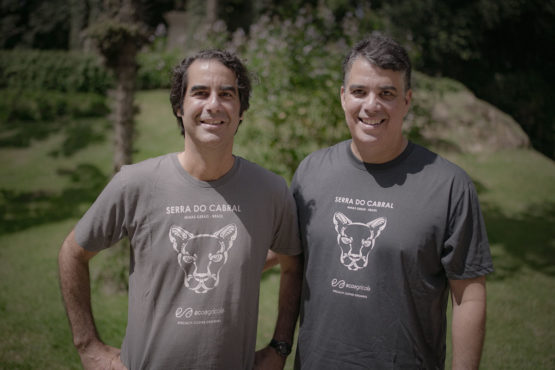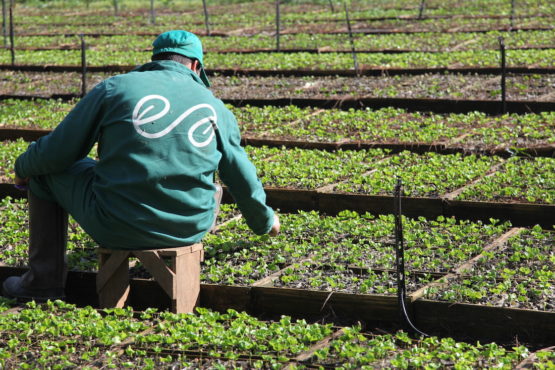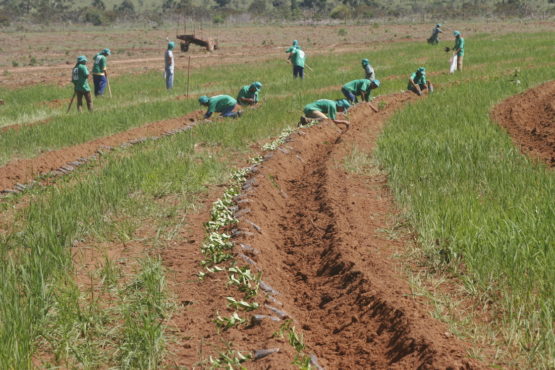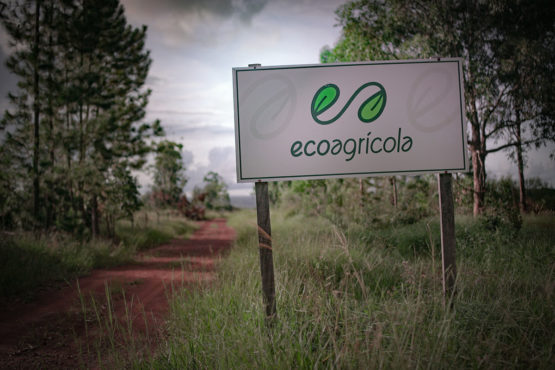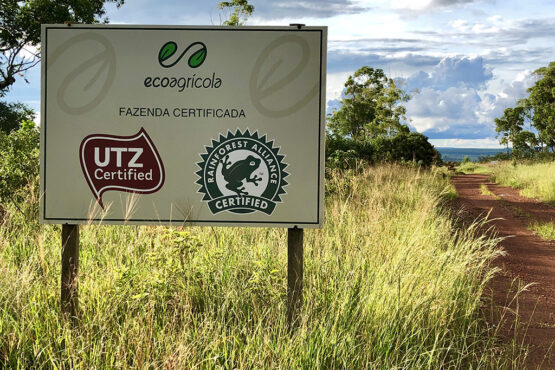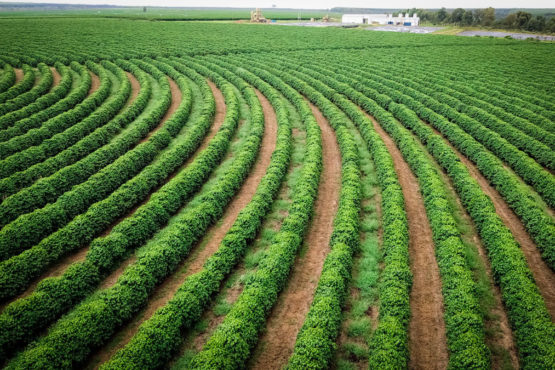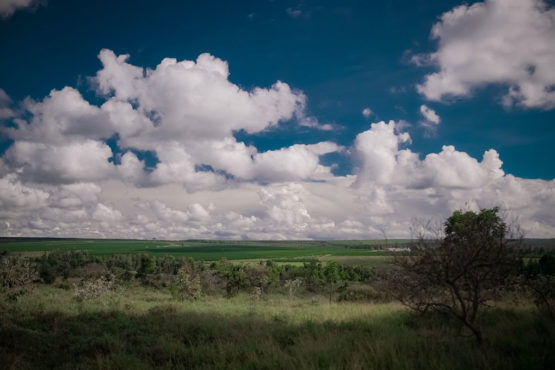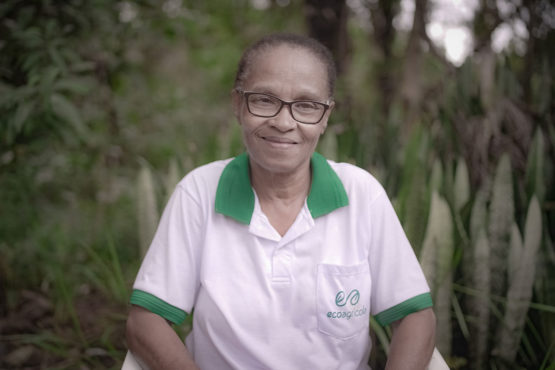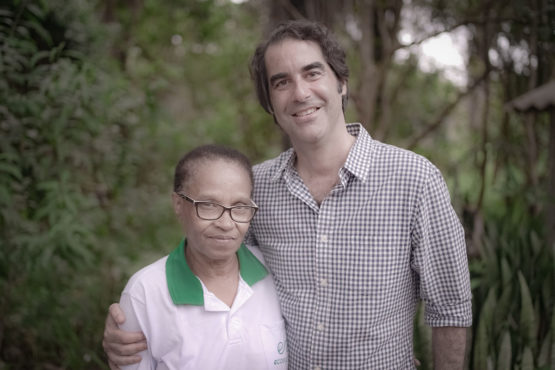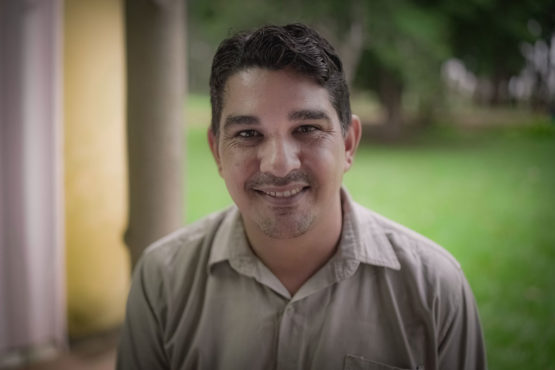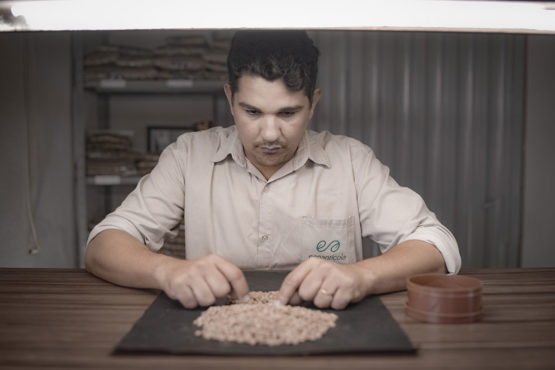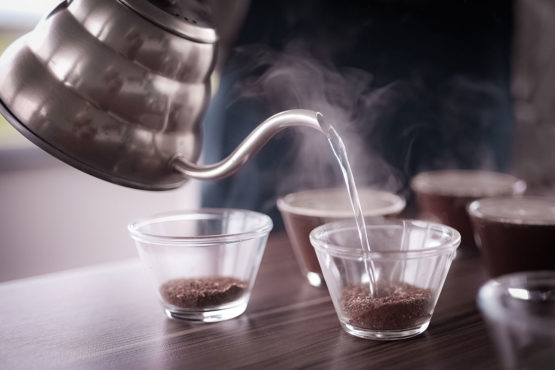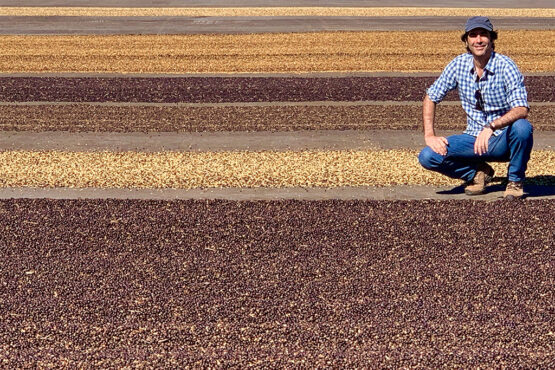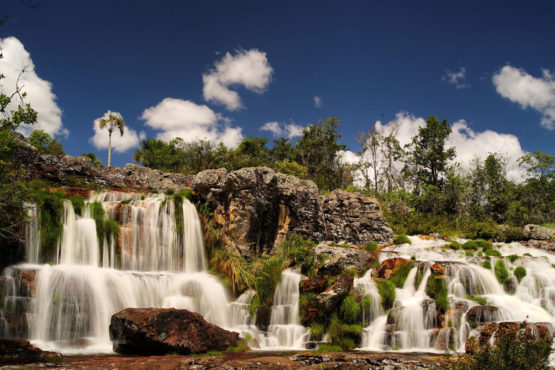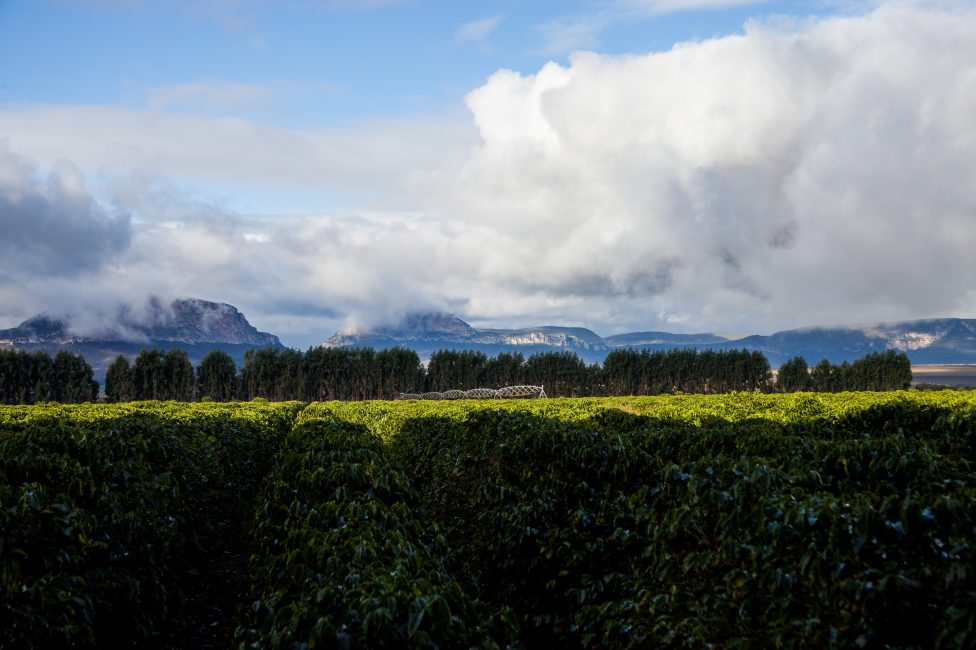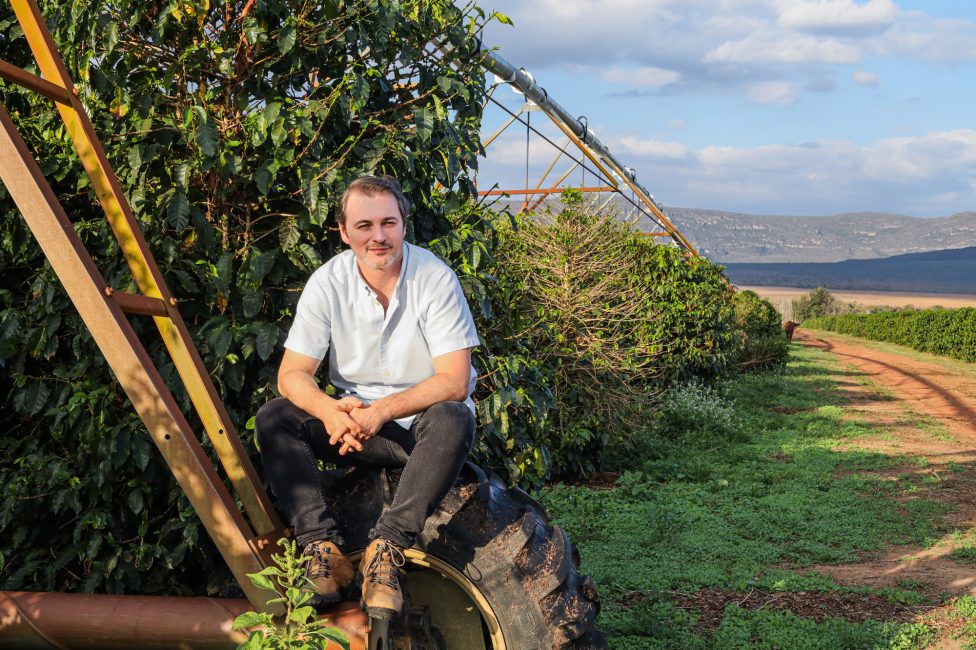Borralha
Jammy sweetness, with dates, black cherry and toasted almond. Great structure and balance. Pairs well with milk.
This coffee comes from the Serra do Cabral plateau, a stunning region in the Chapada de Minas in the central north of the Minas Gerais State in Brazil. With a high altitude of 1,100m above sea level, a mild climate (with sunny days, cool nights and well defined rainy and dry seasons), flat terrain and plentiful water, the region has ideal conditions for growing fine coffee.
Initially established in 1975 by Henrique Flanzer, Fazenda EcoAgricola is a 1,700-hectare estate in, with just over 340 hectares dedicated to coffee. After his retirement in the early 2000s, Henrique passed the estate to his sons, Marcelo and Roberto, who managed operations until the farm’s recent sale in 2022. Today, the estate is managed by Pedro Henrique, who looks after day-to-day farming and operations, and Alan Fiuza, who oversees the company’s commercial business.
The Flanzer brothers were the first to recognise the incredible potential of Serra do Cabral as a coffee producing region. In 2006, in a bid to diversify their crops, Marcelo and Roberto landed on coffee as a great option. Not only does the region exhibit the characteristics ideal for quality production, but coffee also met their criteria of a crop that allowed them to focus on quality and environmental sustainability, achieved through cutting edge technology.
“Among many possibilities, we chose coffee for the great fit with the region: altitude, climate, water, terroir. It also met our goal to build the business in a environmentally sustainable way using technology, and our desire to be able to produce quality driven products” – Marcelo Flanzer
The family planted their first coffee nursery in 2006 and began harvesting coffee in 2009. Today, some 340 hectares of the estate are planted with Red Catuaí and and Yellow Catucai. There is also a small number of Bourbon trees.
To this day, EcoAgricola are still the only coffee producers in the Serra do Cabral region. Their efforts have been recognised in a myriad of awards, including three Cup of Excellence awards, and placing 1st in the Minas Gerais Quality Award in Chapada de Minas four times over. In this sense, Marcelo and Roberto were true pioneers – establishing and developing a new coffee growing region that is now internationally recognised and celebrated.
SUSTAINABILITY
From the get-go, EcoAgricola has focused on producing the highest quality coffee possible, balanced with an objective to carefully preserve and protect the local water sources and surrounding forest areas. Over 50% (860 hectares) of the estate is dedicated to a natural reserve that has crystal clear streams, native Cerrado Bioma vegetation, and abundant wildlife. Ecological corridors run throughout the estate, allowing the free movement of animals and help maintain the area’s ecosystem and biodiversity. The natural reserve also plays a role in acting to inhibit the development of coffee pests, and therefore the need for pest control and chemicals.
Environmental sustainability has always been intrinsic to EcoAgricola’s mission, with the concept of preservation built into the company’s name – “eco” refers to “ecological” and “Agrícola” means “agriculture”. Outside of maintaining the natural reserve, the company uses the agricultural side of their business to generate funding for ecological preservation.
“Sustainability and ethics are very important to us. Today sustainability is very fashionable, but when we began to produce here in the 1970s it was something just a few people cared about… To us sustainability means creating something that is environmentally responsible, socially fair and economically viable.” – Marcelo Flanzer
Whilst MCM does not market the coffee in this way, EcoAgricola is Rainforest Alliance certified, UTZ certified and is also a member of the BSCA.
When Marcelo and Roberto first started to produce coffee, there were two big challenges that they faced. Firstly, coffee had never been produced in the region before, so there was little infrastructure and no ‘accepted’ practices that had been developed and adapted over time in the region. Additionally, the brothers had no experience in coffee production themselves. To gain knowledge and skill, they surrounded themselves with experts who were able to guide them to make decisions that would maximize quality and yield and advise the team on how to do things in the most environmentally responsible way.
Water for the property is sourced from the natural springs as well as dams that are used in drier periods. The dams have been built at higher elevations which means they are able to water the farm by gravity, therefore, saving energy.
One of the first decisions to be made was how to irrigate the coffee plantation. After much consideration of factors such as water availability and terrain, the team chose to use pivot irrigation. This method of crop irrigation (also known as ‘waterwheel’ or ‘circle’ irrigation) involves equipment that rotates around a central pivot and waters the crops with sprinklers. The sprinklers irrigate a circular area around the pivot point, often creating a circular pattern in crops when viewed from above. Centre pivot irrigation typically uses less water compared to other surface irrigation and furrow irrigation techniques, helping to conserve water.
Water for the property is sourced from the natural springs as well as dams that are used in drier periods. The dams have been built at higher elevations which means they are able to water the farm by gravity, therefore, saving energy.
Over the past decade, the brothers succeeded in installing five pivots, all of which use LEPA (Low Energy Precision Application) technology. LEPA ensures that the plant canopy remains dry and water is applied directly to every second furrow. This requires some special management and tillage practices but is also one of the most resource-efficient means of irrigation. They have also installed weather stations and monitoring systems that measure things like soil moisture, rainfall and evaporation rates, to help with inputs assessment. In 2016 they began using the “precision agriculture system”, which measures not only the average input requirements for the whole plantation but also the different needs of every individual hectare, and then with aid of GPS monitoring, they are able to ensure that each plant receives only the nutrients and water it needs.
In addition to their conservation activities, Ecoagricola engages socially with the small farmer communities that surround them. They have helped many of these small farmers with fiscal education and helped them sell their produce at the estate’s canteen and also to other companies and markets. Marcelo and Roberto also regularly participate in their community meetings and try to find ways to collectively help and support their local community. They also help directly by investing in specific community needs, such as school repairs, uniforms for students, etc.
Judite, the cook at Serra do Cabral, summed up EcoAgricola’s approach to business, their staff, and their community beautifully: “Here we don’t have boss and employee, we have family”.
HOW THIS COFFEE WAS PROCESSED
Since 2015, EcoAgricola has embarked on a quality-driven project for post-harvesting with the University of Lavras, coordinated by Professor Flavio Borém. Professor Broém is one of the world’s leading coffee quality researchers, and his advice has been crucial in informing the farm’s post-harvest practices.
Lots are defined by plot, variety, and method (natural, pulped natural), and 100% traceability is maintained from the moment the cherry is picked. During quality control and sensory analysis, every lot is assessed by the QC team (which is headed up by full-time Q-Grader, Danilo), and any quality issues can be traced back to the individual hectare, helping identify and prevent any future issues.
After the ripe cherries are picked, they are taken to the farm’s mill where they are processed using either the natural or the pulped natural method. The farm has also started experimenting with some fully washed lots and other methods of fermentation, though this is in the very early stages.
Special care is taken with natural lots, such as this 100% Yellow Catucai lot. After being picked, the coffee is sorted to remove any additional underripe or damaged cherries. It is then washed and laid out to dry on raised beds for 2-3 weeks, where it is carefully turned regularly to ensure it dries evenly. After 45–60 days rest the coffee is then dry milled at the farm’s own dry mill.
WHAT’S IN A NAME
Coffee at EcoAgricola grows alongside beautiful crystal clear streams. This coffee is named Borralha (pronounced ‘bo-hah-lee-hah’) after a stream that runs through a protected part of the estate, called ‘Reserva natural da Borralha’ (Borralha Natural Reserve).

